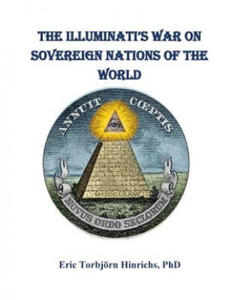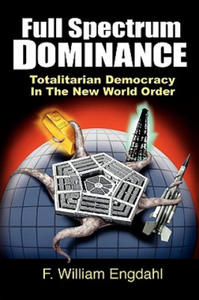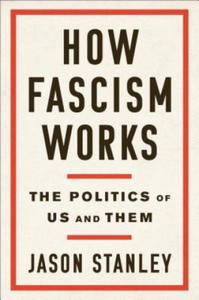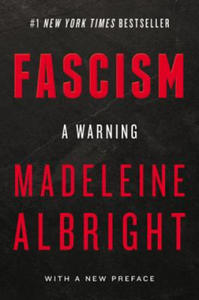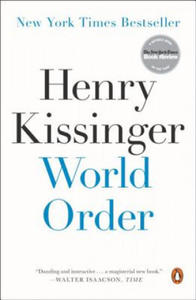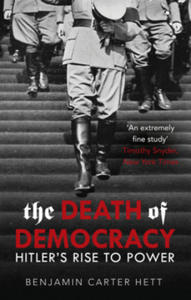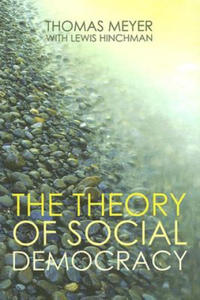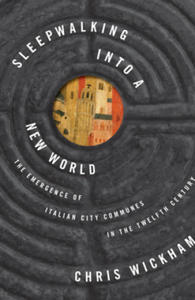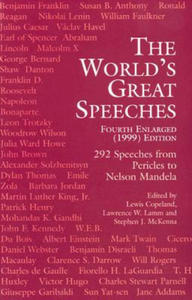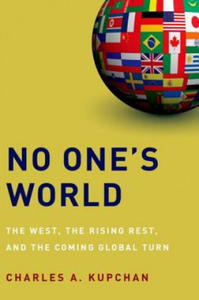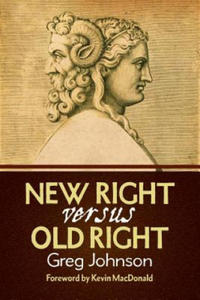libristo democracy fascism and the new world order 11578523
- znaleziono 46 produktów w 2 sklepach
The Iluminati's War on Sovereign Nations of the World: The New World Order and the End of Democracy Createspace Independent Publishing Platform
Książki / Literatura obcojęzyczna
This book documents the past histories of wars and depressions which were caused by global elitists. My purpose is to alert citizens of every country to the dangerous situation developing, so that we can adopt preventive measures to stop the next conflagra
Sklep: Libristo.pl
Full Spectrum Dominance: Totalitarian Democracy in the New World Order Edition.Engdahl
Książki / Literatura obcojęzyczna
Check the Amazon Reviews. People are raving about Full Spectrum Dominance "must read." - M. Lachlan White "Essential reading" - Lori "The Rogue Reader Mom" "A book everyone needs to read " - William Fetty
Sklep: Libristo.pl
How Fascism Works Random House USA Inc
Książki / Literatura obcojęzyczna
"A vital read for a nation under Trump."-The Guardian"By placing Trump in transnational and transhistorical perspective, Stanley sees patterns that others miss. . . . Twenty months into Trump's presidency, the evidence is mounting that he's right."-The New York Times Book Review (Editors' Choice)Fascist politics are running rampant in America today-and spreading around the world. A Yale philosopher identifies the ten pillars of fascist politics, and charts their horrifying rise and deep history.As the child of refugees of World War II Europe and a renowned philosopher and scholar of propaganda, Jason Stanley has a deep understanding of how democratic societies can be vulnerable to fascism: Nations don't have to be fascist to suffer from fascist politics. In fact, fascism's roots have been present in the United States for more than a century. Alarmed by the pervasive rise of fascist tactics both at home and around the globe, Stanley focuses here on the structures that unite them, laying out and analyzing the ten pillars of fascist politics-the language and beliefs that separate people into an "us" and a "them." He knits together reflections on history, philosophy, sociology, and critical race theory with stories from contemporary Hungary, Poland, India, Myanmar, and the United States, among other nations. He makes clear the immense danger of underestimating the cumulative power of these tactics, which include exploiting a mythic version of a nation's past; propaganda that twists the language of democratic ideals against themselves; anti-intellectualism directed against universities and experts; law and order politics predicated on the assumption that members of minority groups are criminals; and fierce attacks on labor groups and welfare. These mechanisms all build on one another, creating and reinforcing divisions and shaping a society vulnerable to the appeals of authoritarian leadership.By uncovering disturbing patterns that are as prevalent today as ever, Stanley reveals that the stuff of politics-charged by rhetoric and myth-can quickly become policy and reality. Only by recognizing fascists politics, he argues, may we resist its most harmful effects and return to democratic ideals."With unsettling insight and disturbing clarity, How Fascism Works is an essential guidebook to our current national dilemma of democracy vs. authoritarianism."-William Jelani Cobb, author of The Substance of Hope
Sklep: Libristo.pl
Fascism: A Warning HarperCollins
Książki / Literatura obcojęzyczna
#1 New York Times BestsellerA personal and urgent examination of Fascism in the twentieth century and how its legacy shapes today's world, written by one of America's most admired public servants, the first woman to serve as U.S. secretary of stateA Fascist, observes Madeleine Albright, "is someone who claims to speak for a whole nation or group, is utterly unconcerned with the rights of others, and is willing to use violence and whatever other means are necessary to achieve the goals he or she might have."The twentieth century was defined by the clash between democracy and Fascism, a struggle that created uncertainty about the survival of human freedom and left millions dead. Given the horrors of that experience, one might expect the world to reject the spiritual successors to Hitler and Mussolini should they arise in our era. In Fascism: A Warning, Madeleine Albright draws on her experiences as a child in war-torn Europe and her distinguished career as a diplomat to question that assumption.Fascism, as she shows, not only endured through the twentieth century but now presents a more virulent threat to peace and justice than at any time since the end of World War II. The momentum toward democracy that swept the world when the Berlin Wall fell has gone into reverse. The United States, which historically championed the free world, is led by a president who exacerbates division and heaps scorn on democratic institutions. In many countries, economic, technological, and cultural factors are weakening the political center and empowering the extremes of right and left. Contemporary leaders such as Vladimir Putin and Kim Jong-un are employing many of the tactics used by Fascists in the 1920s and 30s.Fascism: A Warning is a book for our times that is relevant to all times. Written by someone who has not only studied history but helped to shape it, this call to arms teaches us the lessons we must understand and the questions we must answer if we are to save ourselves from repeating the tragic errors of the past.
Sklep: Libristo.pl
World Order Penguin LCC US
Książki / Literatura obcojęzyczna
"Dazzling and instructive . . . [a] magisterial new book." -Walter Isaacson, Time§§Henry Kissinger offers in World Order a deep meditation on the roots of international harmony and global disorder. Drawing on his experience as one of the foremost statesmen of the modern era-advising presidents, traveling the world, observing and shaping the central foreign policy events of recent decades-Kissinger now reveals his analysis of the ultimate challenge for the twenty-first century: how to build a shared international order in a world of divergent historical perspectives, violent conflict, proliferating technology, and ideological extremism.§§There has never been a true "world order," Kissinger observes. For most of history, civilizations defined their own concepts of order. Each considered itself the center of the world and envisioned its distinct principles as universally relevant. China conceived of a global cultural hierarchy with the emperor at its pinnacle. In Europe, Rome imagined itself surrounded by barbarians; when Rome fragmented, European peoples refined a concept of an equilibrium of sovereign states and sought to export it across the world. Islam, in its early centuries, considered itself the world's sole legitimate political unit, destined to expand indefinitely until the world was brought into harmony by religious principles. The United States was born of a conviction about the universal applicability of democracy-a conviction that has guided its policies ever since.§§Now international affairs take place on a global basis, and these historical concepts of world order are meeting. Every region participates in questions of high policy in every other, often instantaneously. Yet there is no consensus among the major actors about the rules and limits guiding this process or its ultimate destination. The result is mounting tension.§§Grounded in Kissinger's deep study of history and his experience as national security advisor and secretary of state, World Order guides readers through crucial episodes in recent world history. Kissinger offers a unique glimpse into the inner deliberations of the Nixon administration's negotiations with Hanoi over the end of the Vietnam War, as well as Ronald Reagan's tense debates with Soviet Premier Gorbachev in Reykjavík. He offers compelling insights into the future of U.S.-China relations and the evolution of the European Union, and he examines lessons of the conflicts in Iraq and Afghanistan. Taking readers from his analysis of nuclear negotiations with Iran through the West's response to the Arab Spring and tensions with Russia over Ukraine, World Order anchors Kissinger's historical analysis in the decisive events of our time.§§Provocative and articulate, blending historical insight with geopolitical prognostication, World Order is a unique work that could come only from a lifelong policy maker and diplomat.
Sklep: Libristo.pl
Death of Democracy Cornerstone
Książki / Literatura obcojęzyczna
'Brilliant. A timely reminder of the fragility of democracy and the dangers of extreme nationalism.' Nikolaus Wachsmann, author of KL: A History of the Nazi Concentration Camps'Extremely fine... with careful prose and scholarship, he brings these events close to us.' Timothy Snyder, The New York Times'Intelligent, well-informed... intriguing.' The Times'In this post-truth, alternative-facts American moment, The Death of Democracy is essential reading.' Kurt Andersen, author of Fantasyland'An outstanding accomplishment.' Rick Perlstein, author of NixonlandA revelatory account of the fall of the Weimar Republic and the rise of Hitler, based on new and award-winning research, and recently discovered archival material.The Death of Democracy explores one of the great questions in all of human history: what caused the fall of one of the most progressive governments in twentieth-century Europe, and the rise of the most terrifying?Drawing on extraordinary individual stories to illustrate its broader arguments, this revelatory new account presents a panoramic portrait of Germany at a turning point, focusing on the global dimension of the Nazi phenomenon as part of a widespread reaction against a world order of triumphant, cosmopolitan liberal democracy and capitalism after the First World War. This was a world situation that pushed its opponents to embrace authoritarianism, nationalism and economic self-sufficiency, kick-starting a revolution reliant upon the innovative exploitation of new media technologies, and the formidable political and self-promotional skills of its leader.Based on award-winning research and recently discovered archival material, The Death of Democracy is an authoritative and panoramic new survey of one of the most pivotal periods in modern history, and a book with a clear and important message for the world today.
Sklep: Libristo.pl
Challenge of Democracy 9e Clarion Books
Inne 1
This best-selling, mainstream American government text is both a comprehensive introduction and a complete program, with the print text and ancillaries carefully crafted to work together to benefit both instructor and student. The Ninth Edition maintains its highly acclaimed, non-ideological framework, exploring three themes: freedom, order, and equality as political values; the majoritarianism vs. pluralism debate; and globalization' s effect on American politics. Extensively updated, this edition includes new examples, figures, and data and current discussions on such topics as the 2006 Congressional election, the Bush administration, campaign finance reform, Hurricane Katrina and FEMA, immigration policy, MEDICARE, and more. Continuing to offer leading-edge technology for teaching and learning, the program now offers course content in Eduspace, Blackboard, and WebCT formats and "In Our Own Words"
Sklep: Albertus.pl
Theory of Social Democracy Polity Press
Książki / Literatura obcojęzyczna
The ascendancy of neo-liberalism in different parts of the world has put social democracy on the defensive. Its adherents lack a clear rationale for their policies. Yet a justification for social democracy is implicit in the United Nations Covenants on Human Rights, ratified by most of the worlds countries. The covenants commit all nations to guarantee that their citizens shall enjoy the traditional formal rights; but they likewise pledge governments to make those rights meaningful in the real world by providing social security and cultural recognition to every person. This new book provides a systematic defence of social democracy for our contemporary global age. The authors argue that the claims to legitimation implicit in democratic theory can be honored only by social democracy; libertarian democracies are defective in failing to protect their citizens adequately against social, economic, and environmental risks that only collective action can obviate. Ultimately, social democracy provides both a fairer and more stable social order. But can social democracy survive in a world characterized by pervasive processes of globalization?This book asserts that globalization need not undermine social democracy if it is harnessed by international associations and leavened by principles of cultural respect, toleration, and enlightenment. The structures of social democracy must, in short, be adapted to the exigencies of globalization, as has already occurred in countries with the most successful social-democratic practices.
Sklep: Libristo.pl
Debating Democracy Houghton Mifflin Company
Inne 1
This reader offers two readings per chapter organized in a debate-style format, representing opposing viewpoints. The straightforward, thought-provoking presentation facilitates classroom discussion. Chapter 4, Civil Society, contains essays by Robert Putnam, "Bowling Alone: The Collapse of American Community," and William A. Galston and Peter Levine, "America's Civic Condition: A Glance at the Evidence." Chapter 8, Public Opinion: The American People After September 11, includes two new essays: "Age of Conflict," by David Brooks and "Which America Will We Be Now?" by Bill Moyers. Chapter 10, Political Parties and Elections: What Was the 2000 Presidential Contest About? includes articles by David Brooks, "One Nation, Slightly Divisible," and Lani Gunier, "What We Must Overcome." Chapter 12, Local Democracy, contains essays for and against suburban sprawl and governance by Gregg Easterbrook and Todd Swanstrom. Chapter 14, The Presidency: How Much Difference Does the Individual Make? features new essays by Fred Greenstein, "Lessons from the Modern Presidency," and Stephen Skowronek, "The Changing Political Structures of Presidential Leadership." Chapter 18, U.S. Foreign Policy: What Should It Be After September 11? includes articles by Charles Krauthammer, "The Real New World Order," and Benjamin R. Barber, "On Terrorism and the New Democratic Realism."
Sklep: Albertus.pl
Carbon Democracy Verso Books
Książki / Literatura obcojęzyczna
Oil is a curse, it is often said, that condemns the countries producing it to an existence defined by war, corruption and enormous inequality. Carbon Democracy tells a more complex story, arguing that no nation escapes the political consequences of our collective dependence on oil. It shapes the body politic both in regions such as the Middle East, which rely upon revenues from oil production, and in the places that have the greatest demand for energy. Timothy Mitchell begins with the history of coal power to tell a radical new story about the rise of democracy. Coal was a source of energy so open to disruption that oligarchies in the West became vulnerable for the first time to mass demands for democracy. In the mid-twentieth century, however, the development of cheap and abundant energy from oil, most notably from the Middle East, offered a means to reduce this vulnerability to democratic pressures. The abundance of oil made it possible for the first time in history to reorganize political life around the management of something now called "the economy" and the promise of its infinite growth. The politics of the West became dependent on an undemocratic Middle East.In the twenty-first century, the oil-based forms of modern democratic politics have become unsustainable. Foreign intervention and military rule are faltering in the Middle East, while governments everywhere appear incapable of addressing the crises that threaten to end the age of carbon democracy - the disappearance of cheap energy and the carbon-fuelled collapse of the ecological order. In making the production of energy the central force shaping the democratic age, Carbon Democracy rethinks the history of energy, the politics of nature, the theory of democracy, and the place of the Middle East in our common world.
Sklep: Libristo.pl
Sleepwalking into a New World Princeton University Press
Książki / Literatura obcojęzyczna
Amid the disintegration of the Kingdom of Italy in the eleventh and twelfth centuries, a new form of collective government-the commune-arose in the cities of northern and central Italy. Sleepwalking into a New World takes a bold new look at how these autonomous city-states came about, and fundamentally alters our understanding of one of the most important political and cultural innovations of the medieval world. Chris Wickham provides richly textured portraits of three cities-Milan, Pisa, and Rome-and sets them against a vibrant backcloth of other towns. He argues that, in all but a few cases, the elites of these cities and towns developed one of the first nonmonarchical forms of government in medieval Europe, unaware that they were creating something altogether new. Wickham makes clear that the Italian city commune was by no means a democracy in the modern sense, but that it was so novel that outsiders did not know what to make of it. He describes how, as the old order unraveled, the communes emerged, governed by consular elites "chosen by the people," and subject to neither emperor nor king.They regularly fought each other, yet they grew organized and confident enough to ally together to defeat Frederick Barbarossa, the German emperor, at the Battle of Legnano in 1176. Sleepwalking into a New World reveals how the development of the autonomous city-state took place, which would in the end make possible the robust civic culture of the Renaissance.
Sklep: Libristo.pl
World's Great Speeches Dover Publications Inc.
Książki / Literatura obcojęzyczna
PART IGREAT SPEECHES OF EARLIER TIMESI. Greece and Rome PERICLES Funeral Oration SOCRATES On His Condemnation to Death ISOCRATES On the Union of Greece to Resist Persia DEMOSTHENES On the Crown The Second Oration Against Philip "CATO, THE ELDER" In Support fo the Oppian Law HANNIBAL To His Soldiers CICERO First Oration Against Catiline The Fourth Philippic CATILINE To the Conspirators To His Troops JULIUS CAESAR On the Treatment of the Conspirators "CATO, THE YOUNGER" The Catilinarian Conspirators MARK ANTONY Oration on the Dead Body of Julius CaesarII. The European Continent ST. BERNARD A Second Crusade ST. FRANCIS Sermon to the Birds MARTIN LUTHER Before the Diet of Worms JOHN CALVIN On Suffering Persecution FREDERICK THE GREAT Before Invading Silesia Before the Battle of Leuthen DESMOULINS Advocating the Execution of Louis XVI MIRABEAU Against the Charge of Treason DANTON "To Dare Again, Ever to Dare!" "Let France Be Free!" MARAT Defense Against the Charges ROBESPIERRE The Festival of the Supreme Being NAPOLEON BONAPARTE At the Beginning of the Italian Campaign On Entering Milan On Beginning the Russian Campaign Farewell to the Old Guard CARNOT Against Imperialism VICTOR HUGO Voltaire GIUSEPPE MAZZINI To the Young Men of Italy GIUSEPPE GARIBALDI To His Soldiers CAVOUR Rome and Italy LOUIS KOSSUTH America's Welcome LEON GAMBETTA To the Delegate from Alsace EMILE ZOLA Appeal for Dreyfus LEO XIII Christian Democracy OTTO VON BISMARCK War and Armaments in Europe BETHMANN-HOLLWEG Germany and the War KAISER WILHELM II Address to the German People JEAN JAUR
Sklep: Libristo.pl
No One's World Oxford University Press Inc
Książki / Literatura obcojęzyczna
The world is on the cusp of a global turn. Between 1500 and 1800, the West sprinted ahead of other centers of power in Asia and the Middle East. Europe and the United States have dominated the world since. But today the West's preeminence is slipping away as China, India, Brazil and other emerging powers rise. Although most strategists recognize that the dominance of the West is on the wane, they are confident that its founding ideas-democracy, capitalism, and secular nationalism-will continue to spread, ensuring that the Western order will outlast its primacy. In No One's World, Charles A. Kupchan boldly challenges this view, arguing that the world is headed for political and ideological diversity; emerging powers will neither defer to the West's lead nor converge toward the Western way. The ascent of the West was the product of social and economic conditions unique to Europe and the United States. As other regions now rise, they are following their own paths to modernity and embracing their own conceptions of domestic and international order. Kupchan contends that the Western order will not be displaced by a new great power or dominant political model.The twenty-first century will not belong to America, China, Asia, or anyone else. It will be no one's world. For the first time in history, an interdependent world will be without a center of gravity or global guardian. More than simply diagnosing what lies ahead, Kupchan provides a detailed strategy for striking a bargain between the West and the rising rest by fashioning a new consensus on issues of legitimacy, sovereignty, and governance. Thoughtful, provocative, sweeping in scope, this work is nothing less than a global guidebook for the 21st century.
Sklep: Libristo.pl
No One's World Oxford University Press Inc
Książki / Literatura obcojęzyczna
The world is on the cusp of a global turn. Between 1500 and 1800, the West sprinted ahead of other centers of power in Asia and the Middle East. Europe and the United States have dominated the world since. But today the West's preeminence is slipping away as China, India, Brazil and other emerging powers rise. Although most strategists recognize that the dominance of the West is on the wane, they are confident that its founding ideas-democracy, capitalism, and secular nationalism-will continue to spread, ensuring that the Western order will outlast its primacy. In No One's World, Charles A. Kupchan boldly challenges this view, arguing that the world is headed for political and ideological diversity; emerging powers will neither defer to the West's lead nor converge toward the Western way. The ascent of the West was the product of social and economic conditions unique to Europe and the United States. As other regions now rise, they are following their own paths to modernity and embracing their own conceptions of domestic and international order. Kupchan contends that the Western order will not be displaced by a new great power or dominant political model.The twenty-first century will not belong to America, China, Asia, or anyone else. It will be no one's world. For the first time in history, the world will be interdependent-but without a center of gravity or global guardian. More than simply diagnosing what lies ahead, Kupchan provides a detailed strategy for striking a bargain between the West and the rising rest by fashioning a new consensus on issues of legitimacy, sovereignty, and governance. Thoughtful, provocative, sweeping in scope, this work is nothing less than a global guidebook for the 21st century.
Sklep: Libristo.pl
New Right vs. Old Right Counter-Currents Publishing
Książki / Literatura obcojęzyczna
Dr. Greg Johnson is the editor of Counter-Currents Publishing and its journal North American New Right (www.counter-currents.com), which draw upon the ideas of the European New Right to promote a new approach to White Nationalist politics in North America. New Right vs. Old Right collects 32 essays in which Dr. Johnson sets out his vision of White Nationalist "metapolitics" and distinguishes it from Fascism and National Socialism (the "Old Right"), as well as conservatism and classical liberalism (the "Phony Right"). Dr. Johnson rejects the Old Right's party politics, totalitarianism, imperialism, and genocide in favor of the metapolitical project of constructing a hegemonic White Nationalist consciousness within a pluralistic society. He argues that White Nationalists are too dependent on the model of hierarchical organizations and need also to work on creating resilient lateral networks. He offers New Rightist answers to a number of disputed questions within the White Nationalist community, including white culpability for our decline, Hitler and National Socialism, the Jewish question, the holocaust, the role of women, Christianity vs. paganism, and the relationships of populism, elitism, and democracy. He sets out some basic principles for creating a growing, resilient, networked movement. Finally, he criticizes distractions and dead-ends like "mainstreaming," conservatism, "premature" populism, and political violence. Engagingly written and constructively critical, Greg Johnson's New Right vs. Old Right is an important contribution to the emerging North American New Right. Praise for New Right vs. Old Right "Greg Johnson's basic point is that we must work to create a metapolitics of explicit white identity-that is, a movement that will develop 'the intellectual and cultural foundations for effective White Nationalist politics in North America, so that we can ultimately create a white homeland or homelands on this continent.' Greg is one of the reasons why I think this is a feasible project. . . . Greg received his Ph.D. in philosophy, and it shows. His forte is the well-developed argument presented in a lucid, easily understood style. Nobody can complain about this book being filled with turgid prose. And I can't find any major disagreements." -Kevin MacDonald, from the Foreword "In New Right vs. Old Right, Greg Johnson lays out his vision for a pro-white movement more focused on ideas, education, and communication than on politics or thuggery. True to this vision, his writing is extremely accessible. Throughout this collection, Johnson breaks down complex philosophical concepts and challenging ideas into tight, efficient sentences and effective explanations. Johnson doesn't drone on trying to sound clever. Like an enthusiastic professor, he truly wants his readers to understand why he believes it is morally right for whites-and all peoples-to determine their own collective destinies." -Jack Donovan, author of The Way of Men "Dr. Greg Johnson's New Right vs. Old Right delineates the differences between two 'Rights,' without repudiating the common philosophical origins of both in opposing egalitarianism and other passé ideologies that continue to dominate much of the world. The primary value of this collection of essays, however, is that Dr. Johnson asks the perennial question, from our side: "what is truth?" In doing so he lays the foundations for a morality of the New Right. This book is therefore unique in the English-speaking Rightist milieu that was, for much of the post-1945 era, poorly served in comparison to its counterparts in Europe. As such, Dr. Johnson's book will be of relevance to many beyond the North American New Right, of which he is a founding father." -Kerry Bolton, author of Artists of the Right
Sklep: Libristo.pl
szukaj w Kangoo libristo democracy fascism and the new world order 11578523
Sklepy zlokalizowane w miastach: Warszawa, Kraków, Łódź, Wrocław, Poznań, Gdańsk, Szczecin, Bydgoszcz, Lublin, Katowice
Szukaj w sklepach lub całym serwisie
1. Sklepy z libristo pl democracy fascism and the new world order 11578523
2. Szukaj na wszystkich stronach serwisu
t1=0.04, t2=0, t3=0, t4=0, t=0.04

